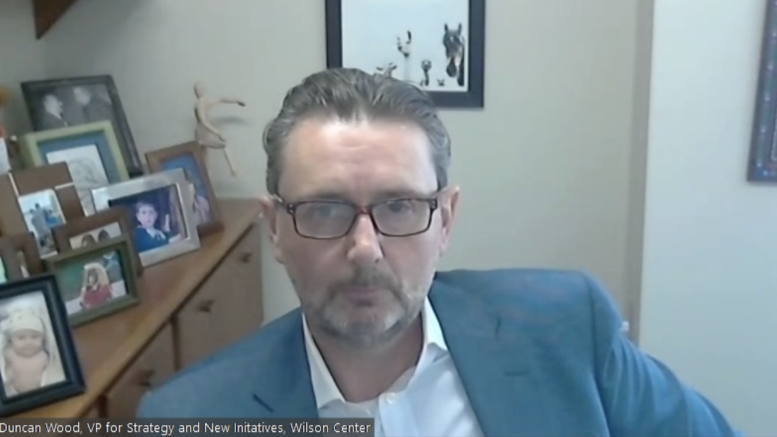The United States needs to smooth out its mine permitting processes, conduct more geological surveys and make the most of its mining relationship with Canada, if it wants to contend with a competitive critical minerals market, researcher Duncan Wood said at The Northern Miner’s quarterly Global Mining Symposium in late May.
The vice-president for strategy and new initiatives at the Wilson Center, a non-partisan policy forum that tackles global issues through research, said there “simply isn’t enough critical minerals” being mined in the world today and that the United States needs to take urgent action to prevent being “shut out” from the supplies needed for energy transition.
“It’s a dramatic… a very serious situation,” Wood told delegates at the virtual event. “One very simple thing that we need to do a heck of a lot more is geological surveys here in the United States… Whilst what’s happening right now is really encouraging, it’s horribly insufficient.”
The demand for battery metals has increased globally as the world looks to meet its decarbonization goals by 2050. According to the World Bank, the supply of critical minerals needed for the energy transition is “more concentrated” compared with fossil fuels. The bank estimates half of the world’s battery metals to be concentrated in about three countries.
In March, U.S. President Joe Biden authorized the Defense Production Act to increase battery metals production and reduce the country’s reliance on China and Russia. The act, which gives the president authority to prioritize the production of specific materials over others, was authorized to support the development of minerals like lithium, nickel, cobalt and manganese.
But Wood believes that the U.S. needs to do a lot more, including having a more defined strategy instead of the current “piecemeal” approach. He also said that the U.S.’s joint action plans on critical minerals with Canada hasn’t delivered a great deal.
“The relationship with Canada is hugely important… because if we’re looking at the energy transition, Canada is a huge producer of renewable energy through its hydro resources… which means that being able to extract these critical minerals in as environmentally friendly way as possible, is going to matter in terms of the greening of the value chain,” Wood said.
He also described the 2022 Canadian Federal budget’s $3.8 billion allocation for the critical minerals sector — praised by many miners in Canada — as a “tiny amount” compared to the investments that are required in the current situation.
Furthermore, Wood believes that the U.S. should follow the lead of other mining jurisdictions and reduce the time required for mines to get permits. “In the United States, it takes about seven to ten years to get permits for a mine, compared to an average of two years in Canada,” he said. “That’s because of a complex permitting process.”
The year 2022 saw a number of mining destinations including Chile, Honduras and Mexico look to introduce stronger rules to protect the environment and nationalize mines. While Wood believes that this is an important trend to keep an eye on, he doesn’t believe an increasing number of countries will look to nationalize its mines since state-owned mines tend to be less effective.
He does, however, predict we’ll see a lot more “playing off” of Chinese versus U.S. interests going forward, with both countries looking to strike deals with mineral-rich nations, as the demand for critical elements increase in the future.



Be the first to comment on "GMS: US needs to take urgent steps to prevent getting ‘shut out’ from critical minerals, says Duncan Wood "